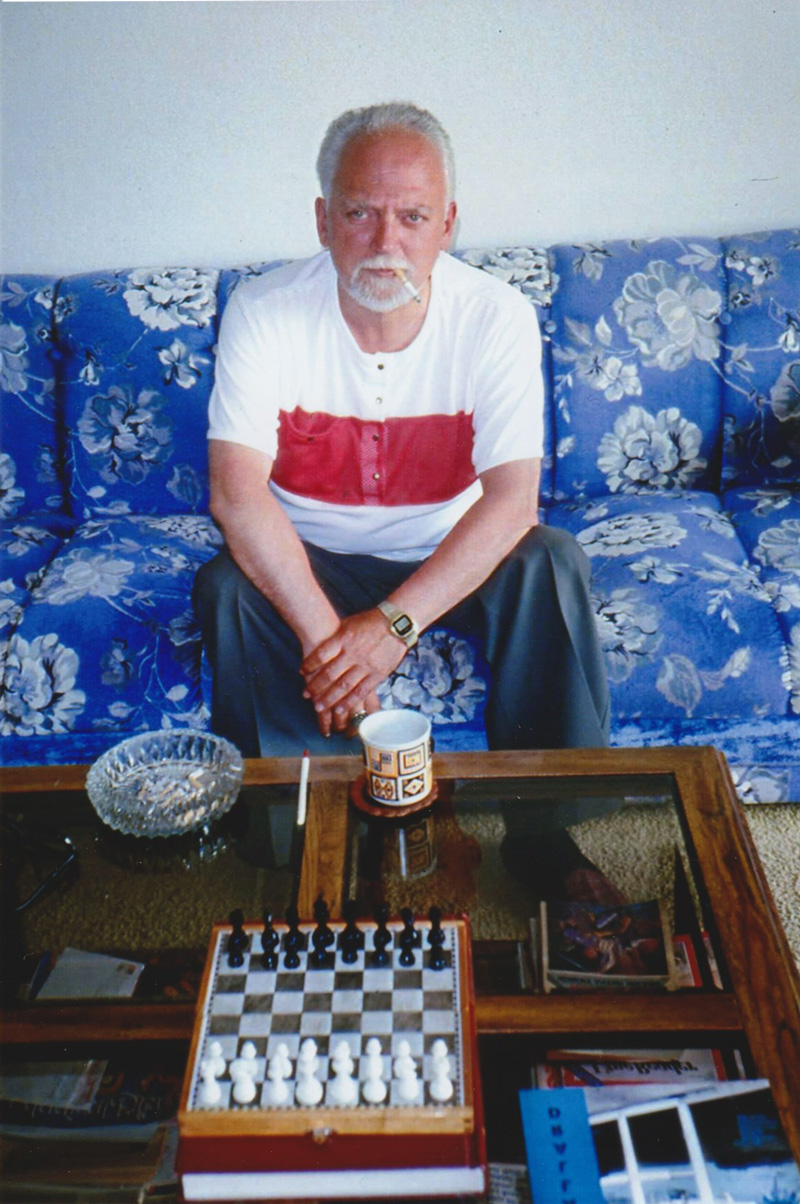A Search for Weirdness –
The Introduction to V. Vale’s Interview of Robert Anton Wilson
By Andrew Bishop

Like many others, I first read Robert Anton Wilson in my early 20s as part of a search for weirdness. I had grown up watching The X-Files, and I was eager for more mysterious, conspiracy-themed entertainment. When I finally picked up Cosmic Trigger, I found that Wilson delivers much more than weirdness. His books intend to upgrade the reader’s brain “software”, just as computer software is upgradable.
Wilson’s recounting of his own initiatory experiences in Cosmic Trigger blew my mind—but not in a flashy, explosive way. Instead, Wilson subtly destabilized my unconscious habits of thought and language. He invited me to remain in a permanent state of questioning wonder.
What impressed me most about Wilson’s writing was that he didn’t seem to draw any conclusions at all. He went deep into psychology, philosophy, politics, and conspiracy theory, but came out the other side not “believing” anything. Rather than picking a side, Wilson nudges his readers into “model agnosticism” (a term from physics which holds that any explanation of the world is only a model, and should not be confused with the world itself). Between the extremes of belief and incredulity, Wilson reveals a whole spectrum of “maybe”.
Seeing the world as a spectrum of “maybe” came very easily after reading Wilson. His “maybe logic” gradually takes hold like a viral infection, erasing all trace of dogmatism and certainty. Rather than being either true or false, facts now existed along a continuum of possibility. This way of operating in the world was a lot of fun as well as a great stress reliever!
Through his fiction, and his how-to manuals such as Prometheus Rising, Wilson embarked on a mission to upgrade our mental operating systems to a “quantum psychology” based on Korzybski’s General Semantics. And with a mischievous sense of humor, he made Korzybski more easily palatable. Thanks to Wilson, I began to naturally pick up habits of thought and language inspired by General Semantics. Never again was something “bad”—at most, it “seemed ‘bad’ to me, at this time, on this date”.
Another shock to my system was Wilson’s idea that scientific materialism could be fundamentalist. Wilson’s “model agnosticism” refuses total belief in anything, and is against all forms of fundamentalism—including models accepted on faith by the scientific community. Having grown up in the U.K., where anything suggested by an apparently “scientific” study or theory tends to be automatically accepted as true, I may never have recognized this error in judgment without Wilson’s laughing guidance.
Wilson’s high hopes for our technological future may appear naïve to a new reader. Inthis 1985 interview, Wilson claimed that space colonies were mere years away, that we would soon eradicate world hunger, and that longevity (if not immortality) was imminent. Wilson’s predictions are best not evaluated for their “accuracy”. In this interview, he acknowledges that as a technological seer he has room for improvement. Instead, Wilson’s predictions are best understood as an expression of his deliberately nurtured optimism. Some of Wilson’s technological predictions may look absurd 35 years later—but his demonstration of optimism, of having a “winner script”, still applies. As Wilson says, “If you think you can’t get the job, you’re not going in for the interview.”
Wilson specialized in conspiracy theory, which during his lifetime was mostly confined to the lunatic fringes of human thought. But our world has changed dramatically since this 1985 interview. In the age of President Trump, conspiracy theory has been popularized, and it seems like we are living in Robert Anton Wilson’s world.
Take, for example, Wilson’s concept of the “reality tunnel”. Wilson explained that we filter out information that doesn’t fit our existing belief system (which Wilson abbreviates as “B.S.”!), focusing only on information that is congruent with our basic expectations. If we are honest, we will admit that we have no idea what is (or isn’t) true. All we can “know” is which bits of information got through our filters.
Facebook, the platform on which most humans now get their news, exploits our “reality tunnels” in the same way. Facebook typically only shows us what fits our particular filter bubble, our existing preferences and reality tunnels. Any content that will release a little bit of dopamine is okay by Facebook—regardless of its “truthfulness”. This digital implementation of the confirmation bias can be hijacked by bad actors such as Cambridge Analytica, which employed Facebook’s mastery over our reality tunnels to reinvent and automate voter suppression and electoral persuasion.
What would once have been considered the crazed ramblings of conspiracy nuts is now mainstream political opinion. Vaccines cause autism, mass shootings are staged, 9/11 was an inside job, and the government controls the weather. In short, Operation Mindfuck (as depicted in Illuminatus!) has taken over contemporary culture. Wilson used conspiracy theory to expose the pernicious traps in our thinking, nudging us to question our fundamental assumptions. In 2019, Wilson’s “model agnosticism” seems more necessary than ever. If he were alive today, Wilson would be among the few remaining voices of clarity.
And, if you’re wondering what Robert Anton Wilson might say about President Donald Trump in 2019, he already said it on Dutch television in 1999, even deploying a rarely-used ‘is’ of identity: “Donald Trump is fucking crazy.”
Robert Anton Wilson immersed himself in conspiracy theory, and yet he managed to remain both optimistic and agnostic about everything to the end. For Wilson, optimism is a choice—another upgrade to the brain’s software. As inhabitants of Wilson’s future, we’ll be lucky to maintain such levels of optimism and discernment.
—Andrew Bishop, April 2019 (www.andrew-bishop.com)
Permission to republish this introduction granted by RE/SEARCH
Thanks to Vale for his kind assistance AND for such a great interview!
Beyond Conspiracy Theory can be purchased directly from RE/SEARCH.
![]()









A very intriguing introduction, it has me ready to get back on the RAW train (audio books while driving).
I f**king love Robert Anton Wilson. I severely hope that his writings become widely spread (to those most likely to understand, implement and appreciate) to the general public. Keep the spaghetti flying!!